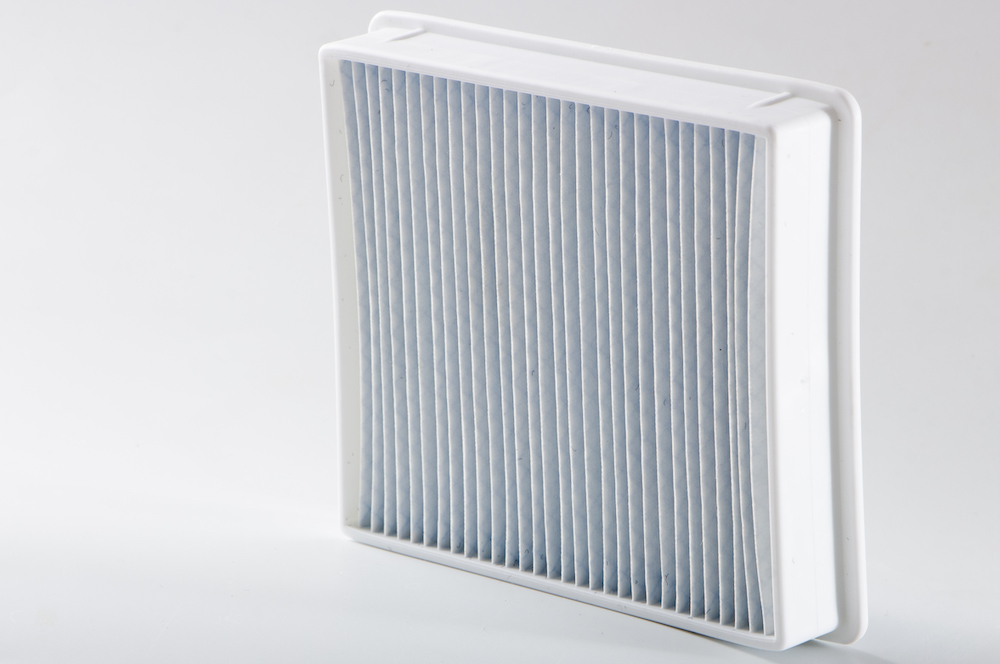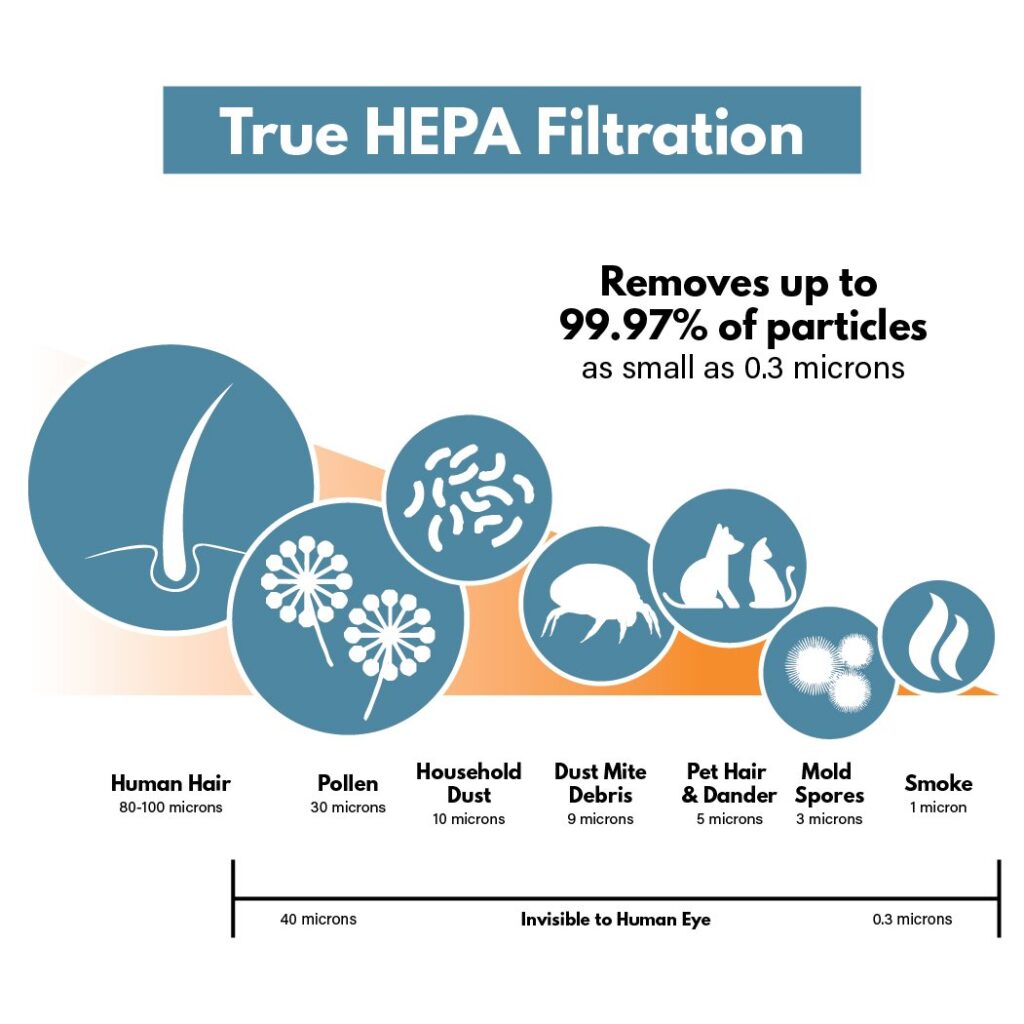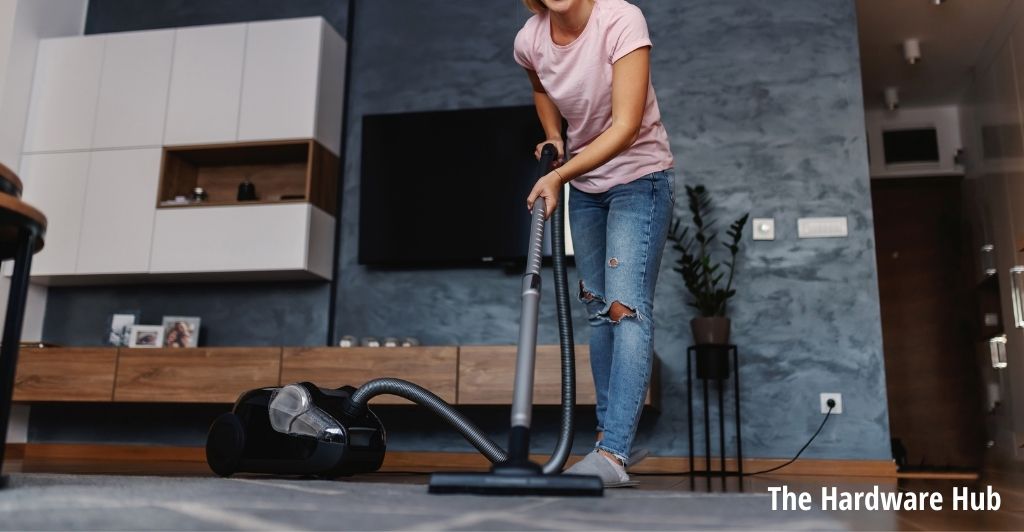Vacuum cleaners are remarkable and can enhance your quality of life. But alas! A lot of them are hard to work out. Some of them have the label as “HEPA Type” while some are tagged as “True HEPA”. Although both of them are mechanical filters, they are not the same.
And if you’re new to this, you can easily get confused and maybe end up purchasing the wrong product. So to guide you with correct information, in this article, we will be discussing the difference between HEPA and True HEPA in detail.
What Are HEPA Filters?
High-Efficiency Particulate Air, abbreviated as HEPA, is inferior to the True HEPA filters. It describes a type of efficiency standard of the air filter. The United States Department of Energy regulates the quality standard of these filters. It removes 99% or fewer pathogens like dust, dirt, moisture, bacteria, and liquid aerosol (size of 2 microns or less) from the air.

The HEPA filter is made up of borosilicate glass fibers. These fibers have less density. So, germ-like fine particles can slip away.
What Are True HEPA Filters?
The True HEPA filters are the highest quality air filtration system used in many appliances, such as vacuum cleaners, air purifiers, automobiles, and aircraft.
True HEPA filters remove 99.97% of all microscopic pathogens as tiny as 0.3 microns. Companies like Aviano, Medify, InvisiClean, Winix, Honeywell, Airthereal, Levoit, and GermGuardian make True HEPA filter air purifiers.

Pros And Cons of True HEPA Filters
Before discussing the difference between HEPA and True HEPA filters, let’s dive into the pros and cons of True HEPA filter:
Pros
The advantages of True HEPA filters are as follows:
- The True HEPA filters are highly efficient as it captures most of the harmful particles from the air and makes the air fresh to breathe.
- These filters trap the allergen particles inside it, thereby reducing asthma symptoms and any other respiratory problems.
- It does not produce any by-product like ozone, ionizers, and PECO, which leads to allergy issues.
Cons
Though there are several advantages of True HEPA filters, it suffers from some limitations as well:
- To maintain the efficiency of the True HEPA filter, it requires filter replacement regularly.
- It doesn’t withdraw odors and smells.
Difference Between HEPA And True HEPA
Now, these are the primary differences between HEPA-type filters and True HEPA filters…
| HEPA Filter | True HEPA Filter | |
| Efficiency | 90-99% | 99.97% |
| Filter Density | Medium | High |
| MERV | 13-16 | 17-20 |
| Particles Capture | 2 microns | 0.3 microns |
1. Efficiency
A HEPA-type filter can remove 90-99% of particles having a size of fewer than 2 microns. It is the minimum filter efficiency of any appliance. On the other hand, a True HEPA filter is more efficient as it can filter 99.97% of pathogens as tiny as 0.3 microns.
2. Pricing
As both the filters are extensively used in the vacuum and air purifier industry, HEPA-type filters are associated with less expensive and compact appliances. The cost of such filters generally ranges from EUR 25 to EUR 80. However, True HEPA filters are connected to large and premium devices. The pricing of these filters ranges between EUR 65-EUR 250.
3. MERV
MERV or Minimum Efficiency Reporting Values is a scale of measurement that is used to measure the efficiency of air filters. The American Society of Heating, Refrigerating, and Air Conditioning Engineers (ASHRAE) formulated this rating to derive the performance of different filters. It means if the MERV rating is higher, the filter is likely better at trapping various particles.
The MERV rating of HEPA-type filters is 13-16, while the MERV rating of True HEPA filters is 17-20, which means True HEPA is highly efficient.
You can also follow the MERV rating to check the efficiency of HEPA filter:
| MERV rating | Dust Efficiency | Particle size |
| 20 | ≥ 99.999% | 0.1 – 0.2 microns |
| 19 | ≥ 99.99% | 0.1 – 0.2 microns |
| 18 | ≥ 99.97% | 0.1 – 0.2 microns |
| 17 | ≥ 99.97% | 0.3 microns |
| 16 | ≥ 99.95% | 0.3 – 1 micron |
| 15 | ≥ 95% | 0.3 – 1 micron |
| 14 | 90 – 95% | 0.3 – 1 micron |
| 13 | 89 – 90% | 0.3 – 1 micron |
| 12 | 70 – 75% | 1 – 3 microns |
| 11 | 60 – 65% | 1 – 3 microns |
| 10 | 50 – 55% | 1 – 3 microns |
| 9 | 40 – 45% | 1 – 3 microns |
| 8 | 30 – 35% | 3 – 10 microns |
| 7 | 25 – 30% | 3 – 10 microns |
| 6 | < 20% | 3 – 10 microns |
| 5 | < 20% | 3 – 10 microns |
| 4 | < 20% | ≥ 10 microns |
| 3 | < 20% | ≥ 10 microns |
| 2 | < 20% | ≥ 10 microns |
| 1 | < 20% | ≥ 10 microns |
4. Filter Density
HEPA filters can remove 90-99% of the airborne pathogens. So, the filter density of such types of filters is medium. On the other hand, the True HEPA filters can remove 99.97% of particles as tiny as 0.3 microns. It has a comparatively higher filter density.
Conclusion
Both HEPA and True HEPA filters are efficient at their place. It on your needs and preferences as to which one is fit for you.
If you want a vacuum cleaner that cleans the dust and dirt with medium efficiency, you can go with HEPA filters. But, on the contrary, if you need a filtration system that reduces airborne symptoms, then the True HEPA filters are the best!
FAQs
Are there different types of HEPA filters?
According to the Institute of Environmental Science and Technology (IEST), there are six types of HEPA filters (A, B, C, D, E, and F). Each type of HEPA filter has its definite characteristics, with A being the lowest efficient and F having the highest efficiency.
Is H13 HEPA better than True HEPA?
The H13 HEPA filters are the most rigorous type of small-particle filters. It is better than True HEPA as they are used in the medical-grade filtration system. To be specific, the H13 filter seizes particles that are more than three times tinier than the regular HEPA filters. It has the efficiency of capturing particles like asbestos, insecticide, anthrax, carbon dust, paint pigment, all types of bacteria and viruses of size less than 0.1 microns. Hence, the H13 HEPA filter is superior.
How much do HEPA filters cost?
The replacement cost of HEPA filters is EUR 165, the average being EUR 62- EUR 125. These filters are expensive to operate, approximately EUR 24 to EUR 40.
What’s better than a HEPA filter?
As per the United States Department of Energy (DOE), a HEPA filter removes particles as tiny as 0.3 microns. On the contrary, the ULPA filter removes 99.99% of allergen particles of size less than 0.1 microns. So, ULPA filters are more efficient than HEPA filters.
How long do HEPA filters last?
The HEPA filter may last for two to three years before replacement in a residential setting. However, the HEPA filters should be checked every six months in a commercial environment or when used daily. If the filter is heavily dirty, it should be replaced immediately.
